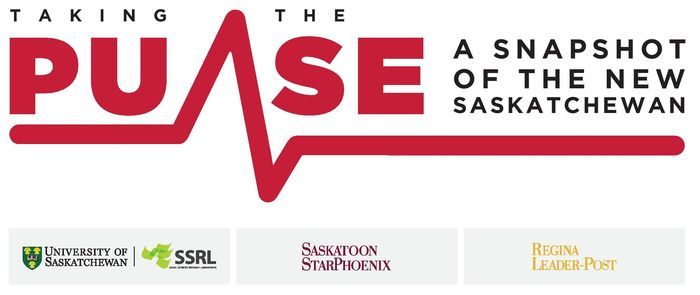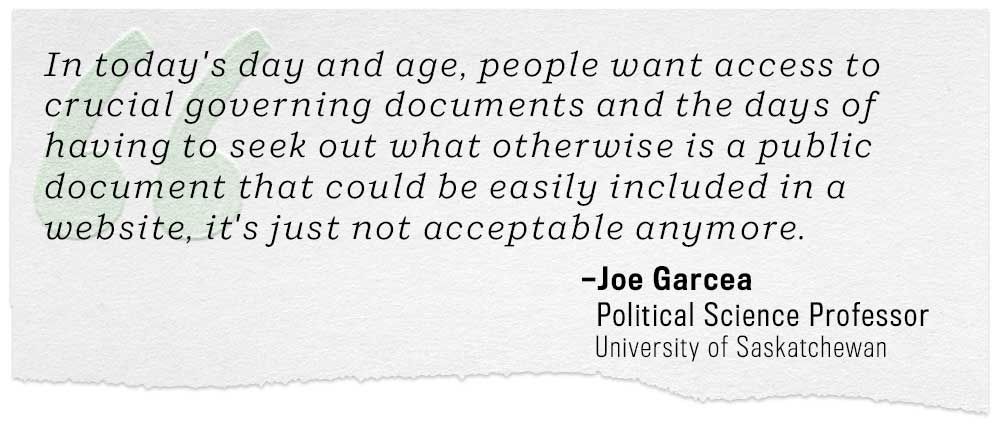Fees May Apply: Majority of Sask. residents surveyed want province to make local governments more transparent
"In today's day and age, people want access to crucial governing documents."

Article content
This fall, the StarPhoenix/Leader-Post emailed every city, town, village, resort village, northern municipality and rural municipality in Saskatchewan to request the same set of public documents.
The goal of the Fees May Apply enterprise was to gather information and to test transparency. How much will governments charge for access to information? How quickly will the documents be provided? Will they bother to get back to us at all?

More than 80 per cent of Saskatchewan residents believe the province should play a role in making local governments more transparent.
Data from a recent telephone survey suggests 82 per cent of Saskatchewan residents agree or strongly agree that the provincial government should mandate local governments — including rural municipalities, northern municipalities, resort villages, towns and cities — to make meeting agendas and minutes publicly available at no cost.
Just three per cent of people disagreed that the province should step in, while the remainder didn’t answer (one per cent), said they didn’t know (three per cent) or neither agreed nor disagreed (10 per cent).
“It’s not common to find that level of support for anything,” says Joe Garcea, a political science professor at the University of Saskatchewan.
“That bodes well for those who would like their municipal governments to move in that direction (toward being more transparent).”
The survey of 402 people was conducted by the University of Saskatchewan’s Social Sciences Research Laboratories (SSRL) this month as part of the Taking the Pulse initiative, which involves SSRL researchers calling a representative sample of Saskatchewan residents four times a year and asking for their views on hot-button topics in the province. The results are published by Postmedia News.
Under provincial legislation, anyone can ask to see public documents such as approved meeting minutes whether or not they pay taxes in a given municipality. Municipal administrators must provide documents within a reasonable time and, if any fee is involved, it must be reasonable.
But an investigation by the Saskatoon StarPhoenix and Regina Leader-Post has found that the notion of reasonable has many interpretations.
The papers contacted all 775 local governments this fall, asking for public documents. In total, 541 municipalities responded to multiple requests for documents within 60 days, a total response rate of 70 per cent. A little over half of the municipalities — 405, or 52 per cent — provided some or all of the requested documents at no cost, or could provide website links where the information was publicly available. Those that charged for documents invoiced for a range of fees. Per-document costs were set anywhere from $1 to $200 and per-page scanning or photocopy fees ranged from $0.10 to $3.50.
Garcea said the StarPhoenix/Leader-Post investigation exposes a “democratic deficit” and the Taking the Pulse data suggests people don’t think those kinds of charges are acceptable.
“In today’s day and age, people want access to crucial governing documents and the days of having to seek out what otherwise is a public document that could be easily included in a website, it’s just not acceptable anymore,” he said.
“The message we’re hearing is that most people would like all municipal governments to move in that direction (toward having documents available for free online) and they’d like them to do it sooner rather than later — even if it means being mandated to do it.”
One of the easiest ways for governments to make public documents available at no charge is to post them online. But almost half of local governments don’t have websites and some that do don’t publish public documents.
The Saskatchewan municipal directory lists all the websites of local governments. The StarPhoenix/Leader-Post also emailed all municipalities without listed websites to confirm that no websites existed. Based on this information, 429 municipalities — 55 per cent — had websites as of the end of November. Of those websites, 57 per cent had meeting minutes available online. This number is sure to be in flux, though, as many government spokespeople indicated they were in the process of developing or improving websites.
When it comes to websites, size matters. Websites are most common in cities (100 per cent have websites), followed by towns (93 per cent), resort villages (73 per cent), rural municipalities (51 per cent), villages (36 per cent) and northern municipalities (20 per cent). The average population of these municipalities is 40,996, 996, 119, 596, 166 and 493 respectively.
But there are exceptions to the rule. For example, the Village of Neville — a community of less than 100 people about 250 kilometres southwest of Regina — has a website where public documents such as meeting minutes and agendas are posted.
“The reason that we have them up there is for accountability and transparency,” said village administrator Cindy Berry. She said the village got a website about two years ago and she is able to manage it and upload public documents onto it, even though she is not a particularly tech-savvy person.
“As far as the website, it’s not a fancy one. It’s just a very simple one,” she said. “It’s not that difficult. It can be time consuming at times, so it may not be always completely up to date right away, but we try to keep it reasonably up to date.”
She said she does not know how many people use the website to access public documents.
Gordon Barnhart, president of the Saskatchewan Urban Municipalities Association (SUMA), says all municipalities want websites, but lack of staff, money and electronic capability can be barriers.
Ray Orb, president of the Saskatchewan Association of Rural Municipalities (SARM), said another reason not all RMs have websites is lack of demand for them.
Orb is the reeve of the RM of Cupar, a community of 500 people about 80 kilometres northeast of Regina. The RM has a website where some public information is posted, but Orb said it’s not the most effective way of communicating with ratepayers, some of whom don’t have access to high-speed internet. When council needs to communicate with ratepayers, the RM sends out a mass text message.
“There are different ways of communicating with people besides websites,” Orb said.
Garcea said the argument that websites aren’t needed because people aren’t accessing public documents doesn’t hold water.
“A lot of people don’t read them because they’re not accessible. So it’s kind of a chicken and egg thing,” he said.
Garcea acknowledged that developing and maintaining websites can be challenging, particularly for small municipalities with limited staff, and argued the provincial government should make it easier for local governments to publish public documents online, perhaps by having provincial government staff run a common website for municipalities that aren’t able to maintain their own.
“We are in the technological age and it’s time that every effort was made to use some technological capability in order to to minimize this democratic deficit,” Garcea said.
Use the tool below to search for your municipality to see how it responded to our request:
Entries with “dead link” indicate a community with a listed website that doesn’t work.
Saskatchewan Government Relations Minister Lori Carr said the province is in the process of developing an online portal on the Saskatchewan.ca website that could do exactly that.
The portal could be operational as early as 2021; at first, it would only host municipalities’ public accounts, but Carr said she imagines it will eventually expand to house other public documents. It’s not clear if that would include agendas and minutes.
Garcea says anything that can help local governments be more transparent is a step in the right direction.
“Despite the fact that municipal governments operate relatively well, they can operate better and this is one of the means by which they think it’ll lead to better operation of municipal government,” he said.
“And then there will be better transparency and accountability and accessibility.”
ahill@postmedia.com
Twitter.com/MsAndreaHill
— With Leader-Post files from Arthur White-Crummey

- Complete series: Fees May Apply
-
 Fees May Apply: (Editorial) Some local governments struggle with transparency
Fees May Apply: (Editorial) Some local governments struggle with transparency -
 Fees May Apply: Key takeaways from local government transparency investigation
Fees May Apply: Key takeaways from local government transparency investigation -
 Fees May Apply: Costs for public documents vary drastically across Sask. municipalities
Fees May Apply: Costs for public documents vary drastically across Sask. municipalities -
 Fees May Apply: Province's proposed web portal could increase local government transparency
Fees May Apply: Province's proposed web portal could increase local government transparency -
 Fees May Apply: Rural internet woes frustrating for municipal governments
Fees May Apply: Rural internet woes frustrating for municipal governments -
 Fees May Apply: Privacy commissioner says web is key to transparency for local governments
Fees May Apply: Privacy commissioner says web is key to transparency for local governments -
 Fees May Apply: Women underrepresented on municipal councils, though many refuse to disclose gender makeup
Fees May Apply: Women underrepresented on municipal councils, though many refuse to disclose gender makeup -
 Fees May Apply: What does your municipality charge for public documents?
Fees May Apply: What does your municipality charge for public documents? -
 'We'll get to it when we get to it;' Pinehouse mayor says freedom of information requests not a priority
'We'll get to it when we get to it;' Pinehouse mayor says freedom of information requests not a priority -
 Shrinking but surviving: No RM amalgamation talks, despite shrinking rural populations
Shrinking but surviving: No RM amalgamation talks, despite shrinking rural populations -
 RM's lack of record-keeping made breach investigation impossible: privacy commissioner
RM's lack of record-keeping made breach investigation impossible: privacy commissioner



















Postmedia is committed to maintaining a lively but civil forum for discussion. Please keep comments relevant and respectful. Comments may take up to an hour to appear on the site. You will receive an email if there is a reply to your comment, an update to a thread you follow or if a user you follow comments. Visit our Community Guidelines for more information.